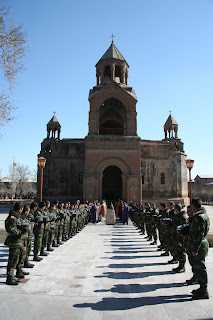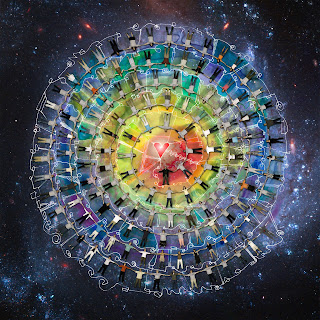Day 12: Sin
Lenten Recipe
Recipe 12: Portobello Seitan Hash
Lenten Journey Day 12 – Sin
You have made it to the 12th day of Lent. Today is an opportunity to look back and say, Yes, I have done it and to look forward and say, Yes, it is possible to complete! Today is also a day not to get caught up in the foolish pride of accomplishment, and instead understanding that there is a purpose for the Journey. Lent is for the betterment of the self. By improving the self, we will be better able and equipped to affect others, society, our community and ultimately our world.
Today we will look at the problem of sin. Perhaps one of the most misunderstood concepts or themes in the Christian faith is sin. Our understanding, or misunderstanding, of sin stems from models that have been set up for us and have conditioned us since childhood. We associate sin with the bad or evil in our life because evil is punished, or at the very least, it produces unfavorable consequences. Even more, in religion, particularly in the traditional Judeo-Christian system of thought, the punishment for evil is augmented by concepts of condemnation and damnation. These models creep into our adult life and skew our perception of life. They distort our view of what life is what life can be.
The truth is, all of our actions – not just evil, but everything we do – has consequences. Actions are made up of emotional thoughts and they are acted out by physical means. Newton’s laws of motion tell us that to every action there is an opposite and equal reaction. This applies to the physical world as well as the spiritual world.
So let’s begin by saying that all evil is sin, but not all sin is evil.
Sin means missing the mark. Imagine a large target and in this target is the center circle. That large black circle is called the bull’s eye. Now imagine a bow and arrow in your hands. You pull back on the bow and let the arrow go. The arrow travels through space, through time and eventually it hits its destination. You have aimed for the bull’s eye, you have aimed for perfection, but somehow it didn’t make it. You missed the mark. You may hit quite a ways off of the mark, you might have hit close by. In fact, you may not have hit the target at all! No matter what the case –close or far from the bull’s eye – you missed the mark! That’s sin. Close or far from the targeted area, it’s a sin. Sin is sin. You aimed for perfection but came short of it. You missed the mark.
Each of us strives for perfection. We all want to hit that mark, we want the best for ourselves, for our families, for our children; but we journey through space and time, much like the arrow and are influenced by many factors including the wind, freak occurrences, lack of focus or unnoticed obstacles, and we do not hit the mark.
When we hit elsewhere, what is our reaction? We go back and try again. We pull the arrow out, put it on the bow one more time and shoot again. In our lives we have opportunities to recreate ourselves and strive for the perfection no matter how many times we miss the goal. When we fail it doesn’t mean anything more than that we are human.
Let’s imagine that same bow and arrow with God being the Archer. Can you imagine what we would see? Every time that God pulls and lets go of the arrow, the arrow hits the bulls eye. It hits the center each and every time. That’s perfection. Now imagine you or I coming and standing in the same spot that God stood. We try, but miss the target. Does that mean we are evil? No. It simply means we are bad shots. It means we hit the wrong place and so we go back and we try again.
With this basic understanding of sin we can understand ourselves, and humanity, not as evil, wicked or worthy of damnation. Rather, we are striving for perfection and fall short. We are in sin.
Life gives us an opportunity try again. Certainly this Lenten Journey is an opportunity to give us a chance to look at the marks that we have missed. We must first pull out the arrows and try again, to fix relationships that have gone sour, to fix perceptions and prejudices, to try again at failed attempts of business, to improve our outlook and attitude, to try again at love. By understanding the nature of sin in this manner, we understand that the improvement we make on our self will have ramifications on the world we live in and the people we touch.
Next week we will take a closer look at what we call the “7 deadly sins” but as a prelude to that I wish to offer you a small little excerpt from a Cherokee diary. Interestingly enough, you will find an lesson that is appropriate for today.
One evening an old Cherokee told his grandson about a battle that goes inside people. He said, “My son, the battle is between two wolves inside us all. One is evil. It is anger, jealousy, sorrow, regret, greed arrogance, self pity, guilt, resentment, inferiority, lies, deception, false pride, superiority and ego. The other wolf is good. It is joy, peace, love, hope, serenity, humility, kindness, benevolence, empathy, generosity, truth, righteousness, compassion and faith.”
The grandson thought about it for a moment and replied, “But Grandfather, which one wins?”
The old Cherokee simply replied, “The one you feed.”
Let us pray the prayer of St. Nerses Shnorhali:
Searcher of secrets I have sinned against you willingly and unwillingly, knowingly and unknowingly, grant me, a great sinner forgiveness for since I was born of the holy font until this day I have sinned before you, by my senses and all the members of my body. Have mercy upon your creatures and upon me a great sinner. Amen (I Confess with Faith 8/24)





